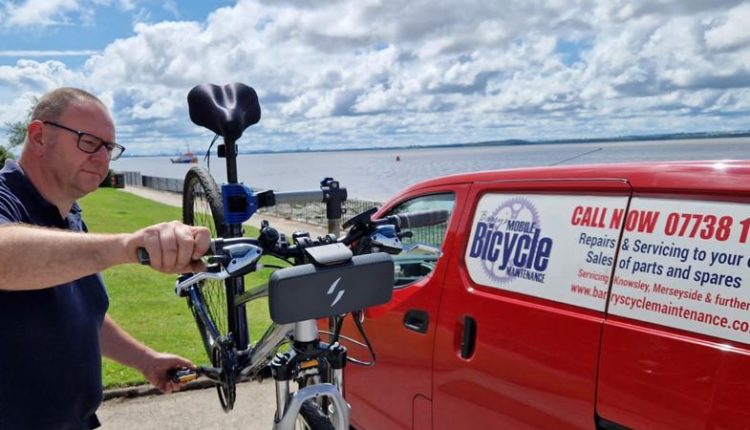Barry’s cycle of life takes him back to his first love
Barry Redman loved working in a Merseyside bicycle shop as a teenager but later embarked on a 20-year law career – now he runs a thriving mobile bike repair businesses and tells LBN how it came about. Tony McDonough reports
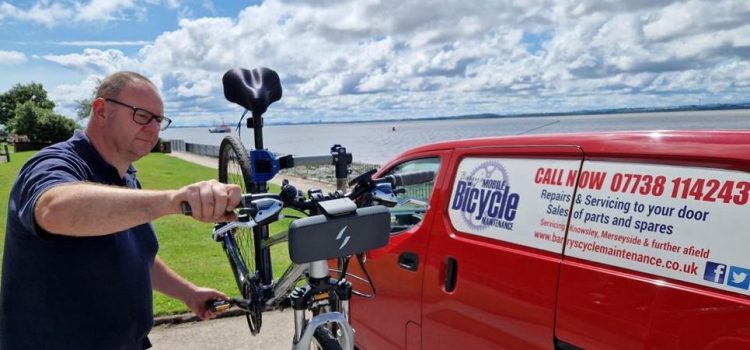
It’s almost a cliche to talk about giving up the job that pays your mortgage to instead earn your living doing something you love.
Barry Redman actually started his working life in 1988 doing just that, working on a Youth Training Scheme at Vanguard Cycles in Huyton, a shop run by Terry Dagnall that was well known in the town.
Raised in Huyton himself, Barry loved working in the shop and gained a wealth of experience. Like many kids, he had always had a bike and took great pleasure in being able to fix them as well.
However, at that point in his life he didn’t see bike repairs as a viable career choice. Instead, he opted for a career in the law, working for Liverpool city centre solicitors as a criminal law clerk.
More than 20 years passed and regularly being rousted out of bed at two in the morning to attend to clients being held in police stations started to lose its appeal. Barry’s thoughts began to wander and consider other possibilities.
“It was time for a change,” he said. “I had been in the law for more than 20 year and the job was not as enjoyable as it had been.”
His attention turned to his first passion – bicycles. He added: “I had always had a bike and had always had a set of tools, fixing bikes for friends and family here and there. I thought ‘let’s give it a proper go and see what comes of it’.”
And so, Barry’s Mobile Bicycle Maintenance was born. He explained: “I started looking around and that is when the idea of working mobile came up. I was initially looking to work from premises but was put off by the cost.
“That brought a moment of panic that it wasn’t going to work. But when I looked into the mobile idea more closely, I realised that it could give me the flexibility to give it a go without too much commitment. If it didn’t work, I could get out quickly.”
Barry undertook an advanced City and Guilds course at The Bike Inn. His previous experience in Vanguard Cycles stood him in good stead and he passed with flying colours. And the start of this new career choice went even better than he expected.
“I went in with the expectation that I would still have to do some freelance law work to pay the bills. But I never needed to,” he said.
“It went well quite quickly and the unique selling point of being mobile proved to be very marketable. And then a number of things happened to cycling shortly afterwards.
“There were British successes in the Tour de France and at the Olympics. Cycling just started to grow and grow. Now the agenda around climate change has pushed cycling even more to the fore. Timing was the key thing.
“There was still a learning curve running a business. People sometimes say working for yourself is brilliant and you don’t have the stresses and pressures of working for a boss. But it is not that simple. It has its own stresses and pressures. I had flyers printed and distributed and the business went from strength to strength.
Today, Barry’s Mobile Bicycle Maintenance fixes and services bikes on peoples’ home doorsteps mainly in south Liverpool and Knowsley but on occasions covering other areas.
Barry works on a self-employed basis and also has another bike mechanic, Steve who helps on a part-time basis.
He has set up a sister operation – a social enterprise called MerseyCycle. Barry, with the help of Steve and volunteers fix up old and unwanted bikesthat have been donated and sell them on. Proceeds from the sales are invested back into the venture to keep recycling going.
MerseyCycle have previously provided courses on how to recycle bikes and other subjects like puncture repair and gear alignment. These courses help to break down barriers to cycling and MerseyCycle hope to do the same in the near future.
Barry tells of a time when a German man contacted him about donating a bike. He had cycled from Frankfurt to Liverpool before going onwards to meet up with a friend who was at university in the UK.
While cycling in Liverpool he got chatting to a former attendee of our cources and the conversation turned to how he is going to get rid of the bikebefore he flies back to Germany.
The former student says “I know who will take it” and Barry’s details were passed on. The bike now hangs proudly in the MerseyCycle workshop.
There has been a big demand for Barry’s services with many preferring to have their bike repaired or serviced at home, rather than having to get it to a shop. And that visibility has proved to be a powerful marketing tool in itself.
Barry explained: “Because of the style of the business is so visible – you are standing at the end of peoples’ driveways fixing a bike – people notice.
“We always laugh because often people come up to you while you are standing over a bike with tools in your hand, the van is there, and ask ‘oh do you fix bikes?’ – you are almost tempted to say ‘no, mate, we sell ice cream’.
“Generally, people would say ‘I can see that you have really worked on the bike – stripping it, cleaning it and putting it back together’. And that has proven to be great word of mouth.
“The customer would phone their mates up and say ‘I’ve had my bike serviced today when I was working from home. The man turned up and I made him a brew and an hour later I was given back a shiny back that felt as good as the day I bought it’.
“So, they would spread that message to other people. Additionally, people in the street would see you and talk to you and you would give them a flyer. Not every flyer will bring back a job but they may pass the flyer on.”
“In the summer I do work in a few schools as well as a couple of cycle hubs in Liverpool. There are generally 10 bikes in a hub so that means booking a couple of days out for servicing and repair.
Thanks to the increasing popularity of cycling, and the growth in cycling paths, more and more people are buying bikes both for pleasure and to get them to work and back. And servicing is one of the things that keeps Barry busy.
“One of the main pieces of advice we give is ‘how to oil your chain’. It’s amazing the number of people who don’t oil it at all or put so much oil on it just looks like a rubber band. Some are so dried out they sound like an old World War II tank.
“Dirty chains contribute to worn and slipping gears. It is odd to know you actually do not need that much oil on your chain.
“The same set of tools that we used 20 years ago still exist but now there are other tools for things such as hydraulic brakes and electronic systems.”
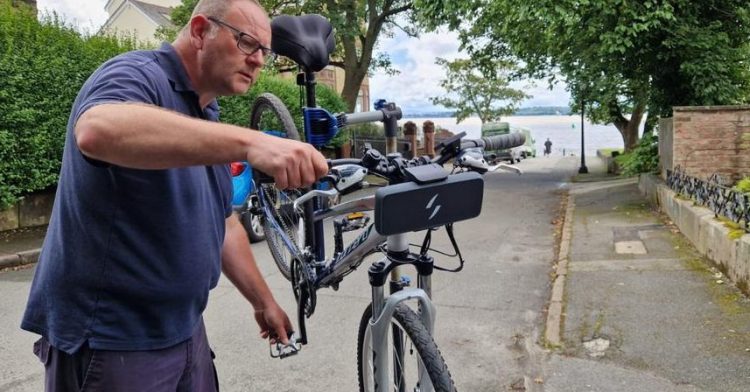
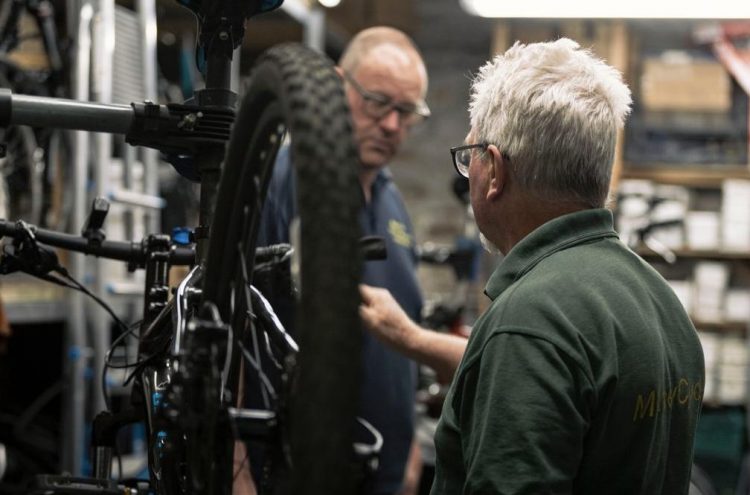
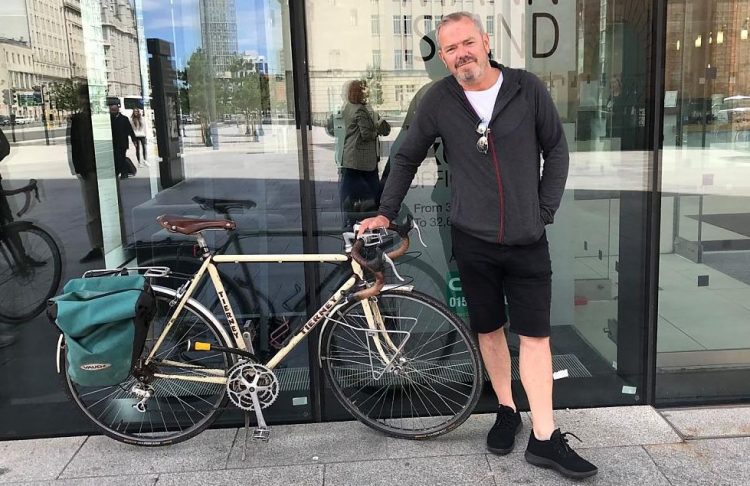
Barry is proud of the work he, Steve and the volunteers do at MerseyCycle which has become part of what is known as the circular economy.
“Bikes that are donated to us are stripped out by myself, Steve and the volunteers and we sell them on. It is a circular thing. The sale of one bikefunds the recycling of the next,” he added.
“It is a good outlet for people to be able to buy a bike that doesn’t cost the earth and they know has been stripped and rebuilt and comes with a guarantee. People buy second-hand bikes and often find it is an absolute wreck.”
As you might expect Barry is passionate about cycling in general. He has run cycling events for people with disabilities on adapted bikes.
READ MORE: Liverpool unveils £11m plan for trio of cycle lanes
READ MORE: Liverpool city region to invest £16m in cycling routes
He acknowledges the improvements in terms of greater awareness of cycling and in the increasing provision of cycle lanes. But he feels a level of frustration at the pace of change, particularly in comparison to other European countries.
“Cycling is a very difficult political discussion,” he explained. “There are so many conflicts. That attitude shift is going to take a long long time.
“There are positives. We have ambassadors now such as Simon O’Brien (city region cycling and walking commissioner) who are getting the message out there. But there is still a lot of change to be made.
“A customer came back from a cycling trip to Amsterdam and he cycled 500km in a few days and 480km of that was on designated cycle tracks. You hear that and you think ‘wow’. You would wish to do that kind of distance in this country.
“I saw the same thing in Berlin. That is just the difference in culture and it just shows the big step change here that we still need to make.”

